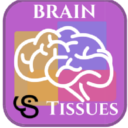Documentation/Nightly/Extensions/BrainTissuesExtension
|
For the latest Slicer documentation, visit the read-the-docs. |
Introduction and Acknowledgements
|
This work was partially funded by CAPES and CNPq, a Brazillian Agencies. Information on CAPES can be obtained on the CAPES website and CNPq website. | |||||||||
|
Extension Description
Brain tissue segmentation plays an important role in many different image processing steps, which offers a possibility to study different neurodegenerative disease progression and global brain structural quantitative parameters (brain atrophy, for instance). For this reason, tissue segmentation procedures have been intensively studied in the recent years. This extension aims to offer a fast, robust and simple solutions for brain tissue segmentation, in which are separated in different modules. See the modules list below to find the most appropriate tool for your study.
Modules
NOTE: The Brain Structures Segmenter is the main module for a general brain segmentation approach, which uses a predefined image processing pipeline in order to result in a smoothed tissue mask. See the module's documentation for more details.
Use Cases
Most frequently used for these scenarios:
- Use Case 1: Specific tissue classification
- There are several image quantitative approaches that are applied only in a certain tissue type (for instance, cortical thickness) in which a previous brain segmentation could be needed.
- Use Case 2: Restrict areas for image quantitative analysis
- A white matter mask could be used for specific measurements in some brain diseases, for example, in Multiple Sclerosis it could be useful to help lesion detection algorithms.
Similar Extensions
References
N/A
Information for Developers
| Section under construction. |
Repositories:
- Source code: GitHub repository
- Issue tracker: open issues and enhancement requests








